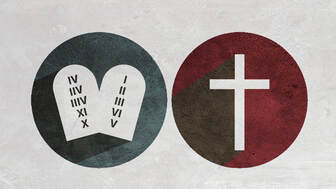|
Wecome to Logia, the personal blog of Paul Hartwig. Reflections and resources to enhance understanding of what God has revealed of himself in Scripture.
|
 'You also were made to die to the Law through the body of Christ, so that you might be joined to Another...' (Rom 7:4) All Protestants of the 16th century were firmly united in their hot convictions over justification by faith as the way to begin the Christian life. Yet not all Protestants were as united in their convictions about how the Christian was to be in relationship to God's Law. Martin Luther and his followers championed a path of total antithesis between the Gospel and Law, while John Calvin and his followers took up a more complementary relationship between Grace and Law. This cleavage within the Protestant camp is no longer as divisive as it used to be, but the truths and implications of that old discussion remain as practical and significant as ever. In this post I want to commend the Lutheran approach to Law and Gospel. I think that an awareness of the two paths to live and ways of reading Scripture are essential and most relevant in every way for the Christian. Before I continue let me remind you that by 'the Law' and the 'legal' relationship to God we are speaking about things that 'are holy, righteous and good' (Rom 7:12). The Law is God's will for us, the divine 'ought' for our lives that provides the content for our obedience before God. At the heart of 'Law' is not dispensable ceremonies and rituals but the demand for a supreme love to God and and equal love to our neighbour. Firstly, the path of the Law. We read Scripture and relate to God in terms of our dutiful obligation. We see, concur and confess the things that please our Lord and show us what we ought to do. The signage on this Scriptural route to God (James' 'royal law') are a tissue of Biblical verses and chapters, all confirming our course. Our own conscience internally resonates with the rightness of what we must do in life to receive his well done. The works of his law are plain to us. We know on this path that what we sow we will reap and that judgment is a necessity for 'will not the Judge of the world to do what is right?' (Gen 18:25). Our new testaments also have much of the Law. Actually it is heightened in the teaching of Jesus and the apostles. Read Matthew 5! 'Be perfect as your heavenly Father is perfect'. So the Legal way runs from Genesis to Revelation and is ever with us and in us. Enlightened hearts and lives in Christ see and feel the law more clearly and closely. Secondly, the path of the Gospel. It is the opposite of and irreconcilable to the Law. It is another path to God, one of faith not of works. It speaks not of the obligatory 'you must' and the moral 'ought'. It speaks only of the divine 'I will' and of the Promise of his Grace. It is the voice of Jesus calling his faithless disciples 'brothers' in his resurrection words to Mary. It is the alien revelatory word (not born of human reason) that says 'there is no condemnation for those in Christ Jesus'. It is the word that says to a Christ-denying Peter 'don't let your heart be troubled. Believe in God believe also in me'. It is the way where the ungodly are declared guiltless and acquitted, and the passive paralytic is promised that 'all your sins are forgiven'. There is only Good News on this way and those who walk this way in Christ are promised that 'no charge can be brought against God's elect since God is the One who justifies'. The Isaianic promises of comfort are found only on this way, where for those who walk that way God says 'if anyone stirs up strife it will not be from Me, and you will confute every tongue that rises against you in judgment' (Is 54:15, 17). Has not your own experience before God testified to the truth of these two ways, the two wavelengths of law and grace? When your conscience speaks and personally applies the Law, and every page of the Bible mirrors its claims with greater force, are we are not shut up in disobedience and do we not cry out with Paul 'wretched man that I am who will deliver me from the body of this death'? We can turn Christianity into the Law very easily. Yet to turn from the Law to Christianity is not 'easy' to our human nature. It is unnatural. That conversion of life and mind requires the revelation of God to enlighten 'the truth as it is in Jesus' and give us the liberty of the Holy Spirit. I think that Martin Luther was a good disciple of the great apostle of liberty. I find myself rather Lutheran on this matter. But hopefully more biblical than Lutheran. Think on these things, and may God himself teach you about this great matter of the Law and the Gospel.
0 Comments
|
Categories
All
Archives
May 2023
|

